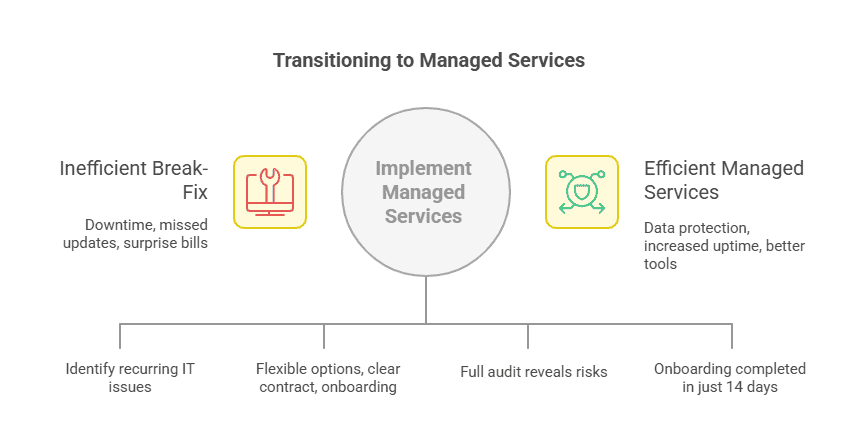
Some businesses still use break-fix services to manage IT issues; this is where IT help is only called in when something breaks. This model might look cheaper at first, but it often leads to greater problems and higher costs.
A report from ITIC shows that downtime is expensive! Very expensive for 90% of companies. One hour of IT downtime costs over $300,000, while 41% face losses ranging from $1 million to $5 million per hour. These costs are unpredictable and add up fast.
This blog explains the real difference between break-fix and managed services. You’ll learn how each model works and what to expect if you choose one over the other.
Make IT One Less Thing to Worry About!
What Are Break-Fix Services and Who Still Uses Them?
Break-fix services mean you call for IT support only when something breaks. You pay for the time and materials needed to fix the issue. There are no monthly payments or contracts. Some businesses like this model because it feels simple and low-cost.
In the past, most businesses had only a few computers. Business operations would not stall completely when an IT issue came up. When they did, IT problems were less common and often easy to fix. So, calling a technician only when needed worked for a while and made sense at the time.
While technology has changed, some businesses still find break-fix works for them:
- Small setups: You only use one or two computers and don’t rely on them all day. Paying for help only when needed might work.
- In-house IT support: Your team handles daily IT needs, and you call outside help for special problems.
- Temporary use: Your budget is tight or you’re between MSP contracts.
This model may seem cheaper, but it usually ends up costing more. Doing nothing until something breaks leads to more downtime, higher emergency rates, and unpredictable repair bills.
What Managed Services Offer That Break-Fix Services Don’t
Managing your IT does not have to be a constant battle. Switching to a managed service model can lower IT costs by as much as 25% and help your team work up to 65% more efficiently. That’s because managed services keep things running smoothly before problems pop up.
Managed Service Providers (MSPs) are there to help keep your systems functioning optimally and keep your business running smoothly. Instead of dealing with unpredictable break-fix bills, you pay a fixed price monthly, which includes:
- 24/7 monitoring: Signs such as failing hard drives, unusual network traffic, or backup errors are given an early warning detection to prevent an outage before it happens.
- Remote & On-site Support: Many issues can be fixed in minutes over a secure remote session. If needed, a technician comes on-site to handle hardware or complex problems.
- Updates & Security Fixes (or patches?): Ensures operating systems, software, and firmware are always current, closing vulnerabilities before hackers can take advantage.
- Strategic IT planning: Your MSP reviews your systems regularly and recommends upgrades, new tools, or process improvements to align with your growth.
- Built-in cybersecurity tools: Firewalls, antivirus, email filtering, and phishing protection are monitored and reported on, so you can prove compliance and track improvements over time.
This setup is better for modern businesses that rely heavily on technology. It supports remote work, reduces downtime, and avoids surprise costs. You’re paying to prevent problems, not just fix them.
How Break-Fix and Managed Services Compare Today
The difference between break-fix and managed services affects more than your IT. It impacts your business results and daily operations.
Costs and Billing
- Break-fix model: You pay when problems happen. One month may be cheap, the next very expensive.
- Managed services model: You pay a set monthly fee. This makes your costs steady and easier to plan for.
Downtime and Support Response
- Break-fix model: You wait for help when something goes wrong. This takes time and hurts your productivity.
- Managed services model: You get fast support. Many issues are fixed before you even know they exist. Gartner reports that downtime costs businesses $5,600 per minute.
Cybersecurity
- Break-fix model: No protection is provided unless you pay extra. Most fixes happen after the damage is done.
- Managed services model: Cybersecurity tools are included. You get ongoing protection, alerts, and updates.
Employee Workload
- Break-fix model: Your staff might attempt to solve issues themselves. That takes time and creates mistakes.
- Managed services model: The MSP handles IT. Your employees can focus on their real jobs.
Picking the right model gives you more control and fewer disruptions.
|
More articles you might like: |
Why The Break-Fix Service Model Doesn’t Fit Most Businesses Anymore
Technology is constantly changing, and most businesses rely on more complex systems. Break-fix services no longer work well for the following reasons:
- Hybrid setups: You use cloud and on-site systems. These setups need ongoing attention, not one-time repairs.
- Always-on operations: Customers and teams expect systems to work all day, every day. Break-fix doesn’t meet that demand.
- Backup and recovery: Managed services include full recovery tools. Break-fix doesn’t help until you’ve already lost data.
- Security and compliance: Many industries now need 24/7 monitoring and clear reporting. MSPs offer this. Break-fix does.
- More cyber threats: Attacks are more common and serious. Break-fix is too slow to stop them in time.
Your business relies on systems that need constant support, not just help after things go wrong.
When Break-Fix Services Still Works
Some businesses can still use break-fix services, but only in specific situations.
Here’s when it might make sense:
- Small setups: You don’t use many computers, and delays in support won’t disrupt your work.
- In-house IT support: Your team manages the systems, and you only need extra help sometimes.
- Short-term needs: You’re planning a switch to an MSP, but still need basic support in the meantime.
Before choosing break-fix, ask yourself:
- How long will it take to get support?
- Can someone help you after hours?
- Will the provider assist with problems such as lost data?
If you want more support but aren’t ready for a full plan, some MSPs offer break-fix and project-based managed services. This helps you transition without a full commitment.
How to Switch From Break-Fix Services to Managed Services

If you’ve used break-fix services for a long time, the switch may feel big. However, migrating to managed services is simple when you get it right.
- Check for problem areas: You face regular downtime, missed updates, or surprise bills. These issues won’t improve on their own.
- Pick the right MSP: Choose a provider with flexible options, a clear contract, and simple onboarding. AlphaKOR offers all of this without locking you into a long-term deal.
- Start with a review: A good MSP starts with a full audit. This reveals risks and helps plan better solutions.
- Know the timeline: AlphaKOR can complete onboarding in just 14 days and provides check-ins to ensure you’re on track.
- Think bigger than IT: This is not just about fixing computers. Managed services protect your data, increase uptime, and provide your team with the tools to do more.
Evaluating the Features of Break-Fix vs Managed Services
Let’s compare what each model includes. This gives you a clearer idea of where each model stands and where it falls short:
| Feature | Break-Fix Services | Managed Services |
| Payment | Pay per issue | Fixed monthly fee |
| Support Speed | Depends on the technician’s availability | Fast, based on your service plan |
| Problem Prevention | Not included | Included with monitoring |
| Updates and Monitoring | You manage it | Included and automatic |
| Uptime | Not guaranteed | High uptime built-in |
| Cybersecurity | Basic or none | Active protection and response |
| Growth Support | Hard to scale | Scales with your business |
| IT Planning | Not included | Included in the monthly service |
You should review these areas quarterly. If your MSP isn’t bringing them up, they’re avoiding accountability.
Break Free from Break-Fix Services into Reliable IT with AlphaKOR
If your business still uses break-fix services, it’s a good time to explore something better. Managed services prevent problems, reduce risks, and strengthen your systems’ stability.
AlphaKOR has been helping businesses for over 30 years, with a 97% customer satisfaction rate. Our onboarding is fast, just 14 days, and we don’t require long-term contracts.
Talk to AlphaKOR today to find out how managed services can help your business run better, grow faster, and stay protected.


